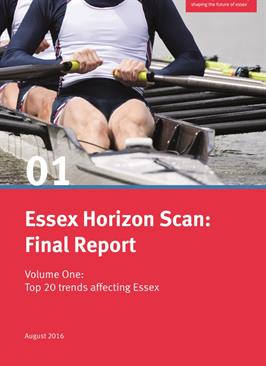The RSA provided research support for the Essex Partnership in its horizon scanning project.
In December 2015 the Essex Partnership Board initiated a multi-partner ‘Essex Horizon Scan’, under the guidance of a multi-partner steering group. The project was designed to systematically identify and examine trends, issues, threats and opportunities that could impact upon public services in Essex. The project aimed to provide a platform upon which partners could plan – individually and collectively – to meet future challenges.
Specifically, the aims of the project were to:
- Consider and prioritise emergent trends and issues that will impact over the next 10-15 years;
- Develop a set of evidence-based outputs that can be used by partners across Essex to support strategic planning at the organisational and partnership level; and
- Inform long-term policy interventions to mitigate risks or exploit opportunities.
Essex partners have been working with the RSA to deliver this project. They invited the RSA to design a process of research and consultation to draw on the expertise of partners and engage them in thinking through future challenges and implications.
The purpose of this report is two-fold:
- To present the top twenty trends identified through an iterative and consultative process. There are further challenges which were identified in the process and these appear in Annex One.
- To analyse what these top-twenty trends might mean for Essex: its leaders, its businesses, its civil society, and its citizens.
A volume two of this report outlines the general strategies that might be adopted to respond to the opportunities and challenges posed by these trends.
The trends can be summarised as follows:
- An economy which is re-structuring with new industries, jobs and opportunity but uncertain foundations and likely transitional stresses including adaptation to anticipated UK departure from the EU.
- Technology changing our relationships with each other, work and services.
- Public services facing new possibilities but new demands and expectations with still limited resources.
- Governance with new powers at the local level but uncertainty about how they can be best deployed and a search for new models of systemic leadership.
- A changing population that exhibits dynamism and enjoys longevity, but creates new demands.
- A society that is plural but divided in many ways creating stresses and some conflict.
pdf 1 MB
Contributors


Related reports
-
State of paralysis
Toby Murray Josh Priest Amy Gandon Natalie Lai Jolyon Miles-Wilson Eirini Zormpa Kimberly Bohling
State of paralysis focuses on young people’s (16-24-year-olds) economic security and what it means for their health and wellbeing.
-
Pupil Design Awards 2022-23: final evaluation report
Aidan Daly
This evaluation illustrates how the Pupil Design Awards contributes to the pupils' creative self-efficacy, awareness of real-world issues and pupil and teachers' design capability, as well as the critical factors supporting teachers to complete projects and how we can make the awards more inclusive.
-
Unleashing the potential of the UK's cities
There is huge scope for cities to add dynamism to economies, cohesiveness to communities and redemption to our environment. The long-term dividends from doing so are enormous. The question is, how it is to be done?



